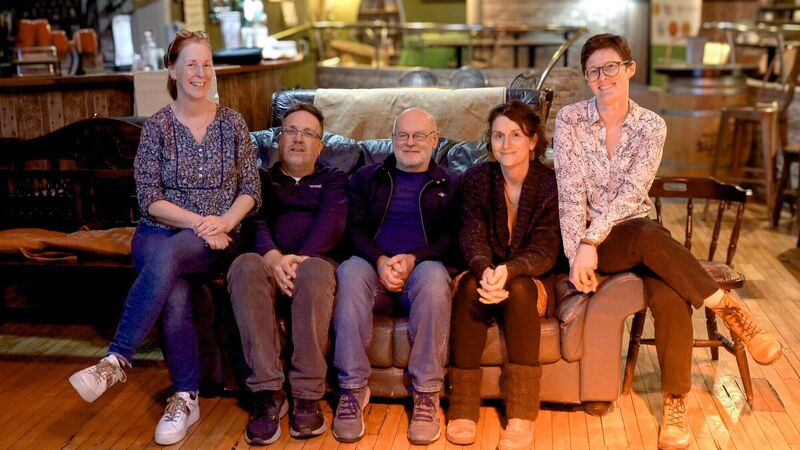West Cork town is on a mission to tackle food waste

Waste Not Want Not Steering Committee, left to right, Kathryn Kingston (Clonakilty Community Resource Centre), Diarmuid Cregan and John Hennessy (Clonakilty Tidy Towns), Allison Roberts and Abi O’Callaghan-Platt. Picture: Rob Murphy.
WASTE Not Want Not is a new community-based project that aims to achieve a reduction in food waste by working with householders, food businesses and farming.
The vibrant West Cork town of Clonakilty is no stranger to being at the forefront of progressive initiatives. From Ireland’s first Fairtrade Town to its busy year-round calendar of festivals and events, such as Clonakilty Bike Fest and Street Carnival, food is at the centre of life.
Its rural coastal setting means farming and fishing are as much a part of the town’s food identity as the artisans of traditional and contemporary fayre, as well as the town’s larger food enterprises such as Clonakilty Blackpudding, Irish Yogurts, Shannovale and Clóna Dairy.
When paired with the town’s lively restaurant, café and bars, and retail outlets that champion local food, Clonakilty is fortunate in its ease of access to the best of things to eat.
It also means those who live here have an uncommonly close relationship with where their food comes from. But, regardless, food waste is a problem here like everywhere else.
In 2020, Ireland wasted 770,300 tonnes of food, enough to feed 22,000 people for an entire year.
While not every bit of food grown, sold, bought and cooked can be saved from waste, much that can be done to get as close to zero as possible. That message is at the heart of the Waste Not Want Not food waste reduction initiative.
Clonakilty has put itself forward to be Ireland’s first community-based food waste champion. The project was devised and is organised by environmental NGO, VOICE Ireland, working in partnership with two of the town’s most successful community groups: Clonakilty Tidy Towns and Clonakilty Community Resource Centre.
Working on the ground is Abi O’Callaghan-Platt, Policy Director of VOICE Ireland, together with Allison Roberts, Community Liaison Officer. I met with both to find out more about the project, its goals, and the unique approach to making the initiative work for everyone.
“Waste Not Want Not is a whole of community approach to food waste reduction,” explains Abi.
The aim is to look at food waste reduction all along the line from farm to fork and beyond, speak with all stakeholders, gathering their perspectives on sources of food waste, solutions they identify, and any barriers to accessing those solutions.
“We then work together to develop a series of solutions applicable within Clonakilty, within each stakeholder sector, and within a whole community level, and apply them.”
The project has identified three stakeholder groups made up of six sub-groups:
Householders; Community Groups
Restaurants and Food Service; Retail and Distribution
Primary Production (e.g. Farming); Manufacturing and Processing
This integration between stakeholders aims to encourage an understanding of the different issues and actions faced by each group, then working together to deliver a real reduction in food waste.
It’s an approach that hopes to motivate and encourage participation, says Abi.
“People can think, well, what can I do as one person or one business? But if you know you’re doing X, a shop is doing Y, a restaurant is doing Z, and that you’re all working together for the same aim, it will help keep motivation and engagement.”
If we can implement solutions during the year, the hope is those solutions will become embedded within the community and so reducing food waste automatically becomes the new norm and won’t drop off when VOICE steps away.
The project kicked off in spring with three “community conversations” with each of the stakeholder groups. Participation was free and facilitated by experts in each area to get ideas flowing and gain insights into perceptions of the stakeholders about why and where food waste happens.
From this, Allison and Abi identified some broad reoccurring issues and encouraged attendees to adopt some key strategies to action, record and report back.
“In all groups, we found some who were already doing a lot and some that aren’t doing very much,” says Allison. “There are some stakeholders we can use as examples and mentors, and some really willing to implement and learn. At the end of each session, everyone selected two, three or more strategies.”
Examples of strategies participants were willing to adopt in one group include:
- Meal planning
- Smart shopping
- Proper food storage
- Constructive cooking (e.g. getting creative with leftovers, portion sizes, batch cooking)
- Nutrient recovery (e.g. food recovery through composting/wormeries individually or through a community group)
- Responsible dining (e.g. request half-portions, doggie bags for leftovers, reusable cups).
Many of these strategies are simple, and in many ways, this is the secret to making a big impact on food waste. Simple actions are easier to slot into already busy lives.
One of the functions of Allison’s role is to compile together resources that already exist and make them easily accessible to the whole community. The Clean Technology Centre at MTU Bishopstown has done amazing work over the years through its Stop Food Waste campaign in developing tools such as a Seasonal Food Calendar, Meal Planning Tips, Leftover Recipes, etc.
“A lot of this work is already done, but on a sector-by-sector basis. This project will bring all those existing resources together in one place, reviving and keeping them alive,” says Allison.
The unique aspect to the Waste Not Want Not project is the holistic approach which acknowledges food waste happens at each link in the food chain from farm to fork, bringing people, ideas, solutions and action together for one community-wide mindset change delivering benefits for everyone.
"A community is more than the sum of its parts, and this initiative is about bringing every element together for a common cause,” says Abi.
“We’re shifting the narrative from individual responsibility to a collective effort. It’s not just about what each person can do at home; it’s about understanding the entire food chain and collectively making a difference.”
The UN SDG target for food reduction is 50% by 2030. Achieving that can only be done through a focused collective action, but this project is less about collection of hard data, and more about behaviour change.
“We don’t have a quantitative target in terms of food waste reduction; what we have is the development of a roadmap,” explains Abi. “The project is funded under the Community Climate Action Programme to develop tools for local communities.
We’ll produce a roadmap detailing our journey and how we took step by step actions that act as a guide for other communities to take on and implement.
Outside her role of Community Liaison Officer, Allison runs her own food business in town, is on the towns Fairtrade Committee, and one of the founders of Clonakilty Bike Fest. Making sure this project has a life after VOICE is hugely important to her.
“VOICE is about the circular economy, getting rooted in a community and then having longevity so VOICE can pull away and the community can keep a project going, and where they can get supports when it needs them,” explains Allison.
“I can already see much of what we’ve been working on can form part of our toolkit and be replicable.”
“Our main task is to keep the motivation and the momentum over the year, so we get the growth and support we need to run slightly bigger, more complex pilot projects and that we’ll need community support for.”
The three stakeholder groups will support each other in this wider community initiative. Even though the motivation for each group will be different (e.g. protecting profit versus protecting household budget), ultimately the goal of reducing food waste works for everyone.
“We need to have the producers and farmers to connect with the consumer. For them, food waste is their livelihood and to see something they’ve gone to such effort to produce end up in the bin is a shame, and nobody wants that,” says Allison.
“That’s why we want this cross-pollination because they all must work together. The farmers don’t want waste because that’s their livelihood, the retailers are doing it mostly out of profit and other motivations, and householders have an opportunity to remember where our food comes from.”
At the Community Conversations, each group was asked why this discussion was important.
“Foremost, it was about loss of money; the bottom line,” explains Allison. “But quickly, it became about resources, inequality.
In all groups, someone put up their hand and said that it was just a sin to waste food.
"That connects all three groups, because they all know food waste is wrong. What we want to do as a project is to keep bringing that to the forefront that we all agree this shouldn’t be happening, so let’s work together and figure out what systemic changes need to happen.”
The progressive and open spirit of Clonakilty makes it the perfect test bed for this project – it has a little bit of everything, says Abi, not just in terms of business, but also with its community supports and activism.
As a Póbal-administered project, the conversations will engage other voices in the town, such as the West Cork Travellers’ Centre and the Direct Provision Centre.
“Those conversations will be about us actively listening to what their inputs are from their cultural backgrounds and where there are opportunities to learn from them,” says Abi.
“It enables us to get access to more marginalised voices that we wouldn’t have otherwise, or that might not step forward to participate in an environmental programme.”
When it comes to measuring success, there will be the practical outputs of the Roadmap and Toolkit that will guide the project into the future for Clonakilty, as well as assisting other towns, villages and cities to follow. But there are also the softer, life-enhancing benefits to the local community.
“We hope Waste Not Want Not will be central to building greater community spirit and cohesion, where different groups can listen to each other and then come together to find some community level solutions,” says Abi. “That this will then bring about a shift of mindset around food waste, and positive actions to keep reducing it, too.”
For more information, email allison@voiceireland.org







 App?
App?


